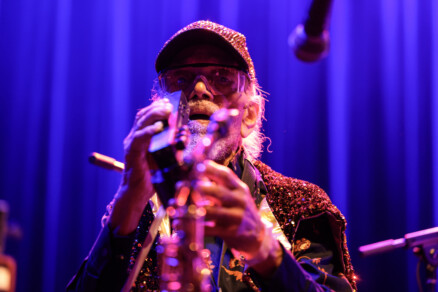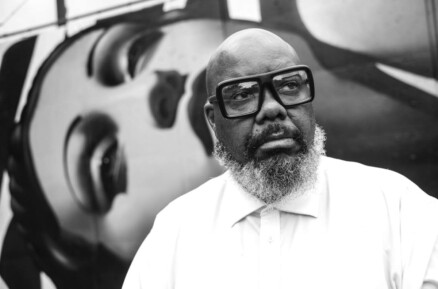A chat with Sunny Sumter, DC Jazz Festival executive director and ‘Jazz Hero’

As the longtime executive director of the DC Jazz Festival, Sunny Sumter has guided the festival through over a decade of growth, turning it into one of the country’s leading music festivals. That was already a hefty task. But this year, her job got even more complicated when the coronavirus pandemic struck.
Since March, Sumter has presided over the festival’s pivot to a virtual format, helping to organize several streaming series to keep the music going amid the shutdown. This weekend, those efforts come to a head with the festival’s 2020 edition, which will be taking place entirely via livestream.
Sumter’s stewardship of the festival, where she draws upon her previous career as jazz vocalist, led to the D.C. native being named a Jazz Hero earlier this year by the Jazz Journalists Association — a recognition reserved for “activists, advocates, altruists, aiders and abettors of jazz.”
Well before the JJA took notice, Sumter’s work had earned her the admiration of many on the D.C. music scene. “It was very appropriate that Sunny be honored for all her contributions through the jazz festival and making jazz part of the Washington, D.C. community,” said Rusty Hassan, a longtime DJ on WPFW 89.3 FM who has sometimes served as a master of ceremonies at festival concerts.
“She’s remarkable, in terms of how she interacts with people and yet knows how to make the hard decisions, what to do and what’s necessary to keep DC Jazz Festival going,” Hassan said.
The hip-hop artist Toni Blackman became friends with Sumter when both were attending Howard University. “Someone like Sunny, who is good at what she does — people often overlook how much work is involved and how much labor, dedication and intentionality is required to be a creative being,” Blackman said. “Sunny’s also a visionary as an art presenter and event producer. Each of those things may have its own network and relationships you have to nurture. I think Sunny is brilliant, and what a blessing she has been — not just to jazz but to music.”
With the 2020 DC JazzFest about to kick off, CapitalBop checked in with Sumter to talk about how she has stewarded the festival and what has inspired her throughout her career.
CapitalBop: Can you share with us some of your central motivations that inspired your career in jazz?
Sunny Sumter: I would say that my life is dedicated to jazz. It really started at a very young age when I heard my first Sarah Vaughan record. I could not tell you that when I was a college student at Howard [University] that I felt that I would be in the seat that I am in now with all of the experiences I’ve had that have prepared me to lead. I am happy to be a contributor to the jazz platform. It is an exciting role that I wake up to every day.
CB: Of the various roles that you’ve worked throughout your career, are there specific positions that have prepared you for how you approach your current work — and the new adjustments to the pandemic?
SS: I used to work for the Aspen Institute. I would tell my friends that it was the best gig. At the Aspen Institute, you bring a small group of people together and talk about some very important issues affecting the state of the world. You tackle those issues together and come up with recommendations. So much of their convening impacts public policy.
I took those six years of working there to my work with the DC Jazz Festival. When you bring musicians to the bandstand and when they come together and make music together by listening to each other, they are responding to what they heard. They’re having this conversation that’s inviting to the audience. I’ve produced and coordinated a lot of those events. You really are producing opportunities for people to walk away changed and inspired. I don’t think I’d have that mindset had I not worked with Aspen Institute.
CB: In light of reimagining how to connect audiences with live performances, can you speak on the benefits of virtual offerings from artists?
SS: There’s nothing that replaces live experiences. In fact, in the first two weeks of March when we were going through this, I was wondering why I was off-balance. I couldn’t figure out what it was. I realize it was that I had not been to a live concert. I have been so accustomed to hearing live music; it’s like food, it’s like water. I missed it. This is how we pivot. Pivot has become one of the most important words in the last six months.
I wonder about the benefits of virtual when it comes to jazz. It’s taken me some time to chew on that. What I can say is we need to feel connected. Music is the bridge to that. Certainly, in our experiences when we have to stay separate and socially distant, the wonderful virtual platform helps us connect to one another. Connecting to one another is vital. You can reach a whole global community, which is the intention behind the DC JazzFest offering that’s happening [now]. We’re not only presenting national but also international artists and we are intentionally reaching audiences around the world.
I have been so accustomed to hearing live music; it’s like food, it’s like water. I missed it.
Sunny Sumter
CB: Can you talk about how all these new virtual offerings may be inspiring different ways for artists to engage with their audiences?
SS: I think that artists are incredibly resilient in how they produce their art. I don’t think that we are connecting with them in any different way than we would if we were presenting them for a live audience that’s in front of them. So we’re connecting the same way with the artist.
I believe that really this is live, touch, feel energy that is absent from this experience, is a critical component to the experience and cannot be downplayed. I would add that —I want that. That’s the element that’s missing for me even as a curator, even as an Executive Director, as an arts presenter of jazz music to the world. The moment that we can come back together and meet even on a small level and have live performance so that you can actually feel that energy and that exchange — that call-and-response between the audience and artists that can solely happen in the live form — I can’t wait. I’m excited.
I wanna get there when it’s safe to do so. I’m not trying to rush it. I am one of those people that believes that this pandemic is real. We have to be very cautious, considerate and kind to one another so that we can move through this pandemic together. In that spirit, it is nice to be able to share this kind of virtual offering with each other. And I am excited about not only the artist part but the open forums. They’re wonderful opportunities for us to grow while we’re distant.
CB: How is coordinating a completely virtual festival this year different from programming for live, in-person festivals during previous years?
SS: It’s the same where you [still] contact the venue and make arrangements for the backline. What’s missing is the [in-person] audience and without selling tickets to people coming and sitting in the seats.
Earned income has been a driver for us for the last few years. When you think about diversified income streams that makes business profitable, we certainly are fortunate that we have had the benefit of a tremendous amount of contributed income that has made us sustainable over the years. We recognize as a jazz festival, earned income is the driver. We made it as a strategy for the last two years and the bottom fell out in March and we could no longer sell tickets.
This festival will be free; we’ve had a 40 percent cut in income as a result of it. We felt that we wanted to reach everyone. So many of us are hurting right now. With unemployment rates, we just can’t charge. Come what may, at some point, earned income is needed to stay in business. We’ll need to figure out that new business model in the next few years before we get back to gathering.


